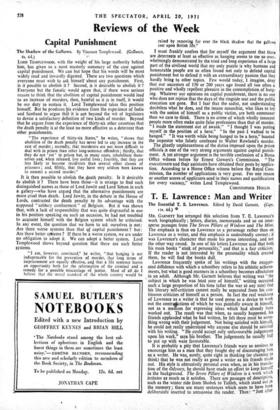Reviews of the Week
Capital Punishment
The Shadow of the Gallows. By Viscount Templewood. (Gollancz. 8s. 6d.) Loan TEMPLEWOOD, with the weight of his large authority behind him, has given us a most masterly summary of the case against capital punishment. We can but hope that his words will be most widely read and inwardly digested. There are two questions which everyone must wish to ask himself about any punishment. First, is it possible to abolish it ? Second, is it desirable to abolish it ? Everyone but the fanatic would agree that, if there were serious reason to think that the abolition of capital punishment would lead to an increase of murders, then, hateful as it is in itself, it would be our duty to sustain it. Lord Templewood takes this position himself. But he produces his evidence from the experience of India and Scotland to argue that it is not beyond the wit of legislators to devise a satisfactory definition of two kinds of murder. Beyond that he argues from the experience of thirty-six other countries that the death penalty is at the least no more effective as a deterrent than other punishments.
"The experience of thirty-six States," he writes, "shows that abolition of the death penalty has never led to any increase in the rate of murder ; secondly, that murderers are not more difficult to deal with in prison than other long-sentence offenders ; thirdly, that they do not ' rot ' in prison but, in many cases, rehabilitate them- selves and, when released, live useful lives ; fourthly, that they are less likely to become recidivists than several other classes of prisoners ; and, fifthly, that they have very seldom been known to commit a second murder."
It is then possible to abolish the death penalty. Is it desirable to abolish it ? There have been those—it is strange to find such distinguished names as those of Lord Jowitt and Lord Sienon in such a gallery—who have argued that the alternative punishments are more cruel than death. Lord Jowitt, in the debate in the House of Lords, contrasted the death penalty to its advantage with the supposed " solitary confinement " of Belgium. But it was shown that, with a lack of responsibility that was quite disgraceful in one in his position speaking on such an occasion, he had not troubled to acquaint himself with the Belgian system which he criticised. In any event, the question that we have to ask ourselves is not: Are there worse systems than that of capital punishment ? but: Are there better syittems 7 If there be a worse system, we are under no obligation to adopt it. We can adopt a better system. Lord Templewood shows beyond question that there are such better systems.
"I am, however, convinced," he writes, " that hanging is not indispensable for the prevention of murder, that long terms of imprisonment are equally effective, and that a life sentence leaves an opportunity both for the reformation of the criminal and a remedy for a possible miscarriage of justice. Most of all do I believe that the moral standard of the whole country would be
raised by removing for ever the black shadow that the gallows cast upon British life."
I must frankly confess that for myself the argument that there are deterrents at least as effective as hanging seems to me so over- whelmingly demonstrated by the tried and long experience of a large part of the civilised world that my only puzzle is why humane and honourable people are so often found not only to defend capital punishment but to defend it with an extraordinary passion that they hardly bring to other topics. Few would today, I imagine, deny that our ancestors of 150 or 200 years ago found all too often a positive and wholly repellent pleasure in the contemplation of hang- ing. Whatever our opinions on capital punishment, there is no one who does not rejoice that the days of the ringside seat and the public execution are gone. But I fear that the sadist, not understanding doubtless what he does, and the insane masochist, who likes to toy with the notion of himself as a public victim, are both commoner than we care to think. There is no crime of which wholly innocent people more often make quite false professions than that of murder. " I made the statement out of swank." " I thought I was putting myself in the position of a hero." " In the past-I wanted to be hanged." "It was worth while being hanged to be a hero," boasted the impostor who falsely confessed to Walter Rowland's murder.
The ghastly unpleasantness of the duties imposed upon the prison officials is one of the very strong arguments against capital punish- ment. A yet stronger argument is the terrible confession of a Homo Office witness before Sir Ernest Gowers's Commission. " The executioners and their assistants have obtained their posts by applica- tion. According to a Home Office witness before the Royal Com- mission, the number of applications is very great. For one reason or another scores of applicants send in their names and qualifications for every vacancy," writes Lord Templewood.
CHRISTOPHER HOLLIS.


































 Previous page
Previous page